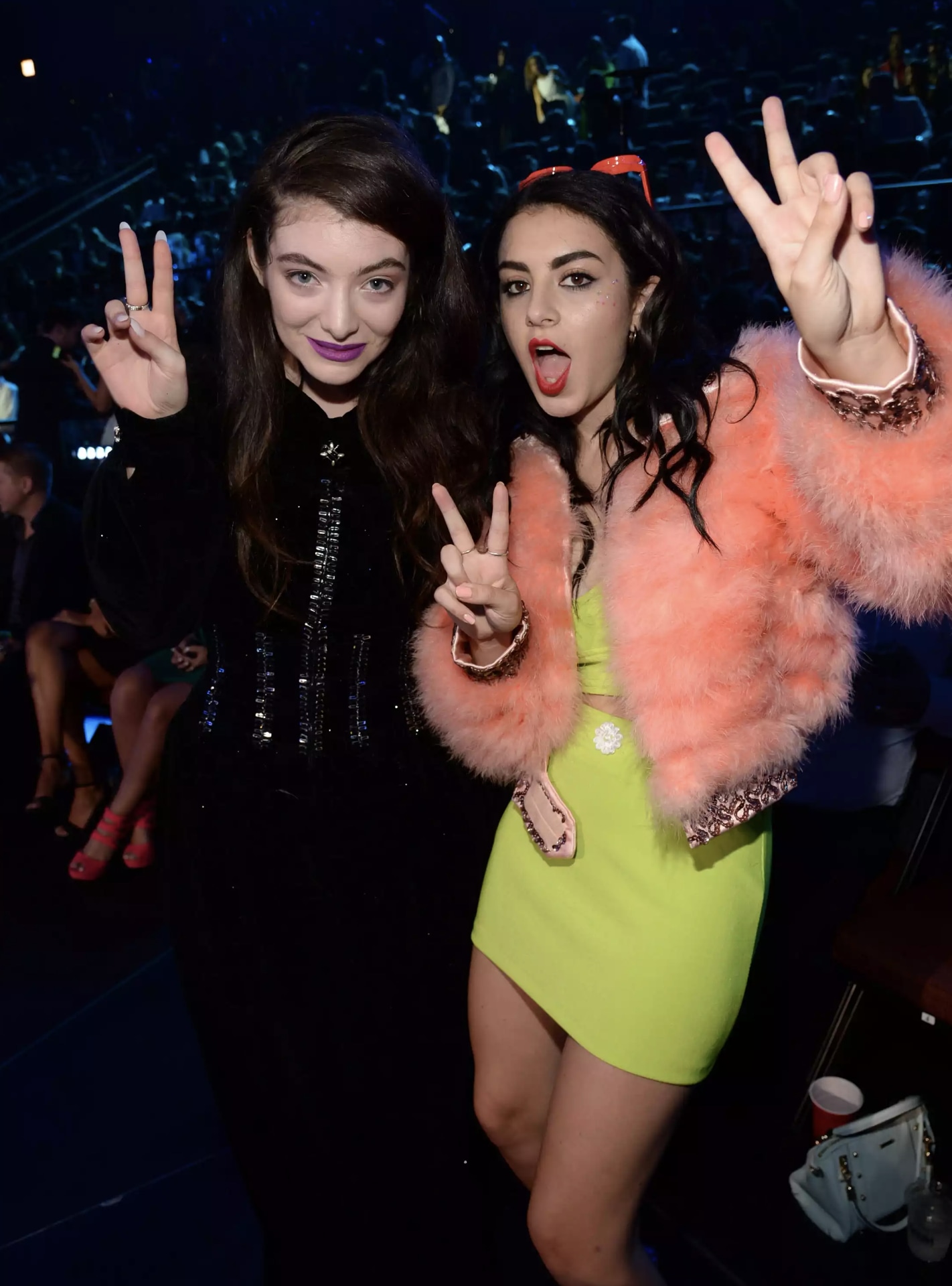 Photo by MTV/MTV1415 via Getty Images
Photo by MTV/MTV1415 via Getty Images
If Barbie associated being a “girl” with an omnipresent hot pink last summer, it's now been taken over by brat green. While Greta Gerwig’s blockbuster playfully explored the plight of “girlhood” through the importance of friendship through fuschia-tinted glasses, Charli XCX’s taken an even more attention-catching approach to the concept with her new album, brat, which is just as abrasive and confrontational as its bold lime cover.
While "Barbie pink" is a traditional signifier of conventional femininity, brat green is visually harsh and almost unsightly, forcing us to reflect on the uncomfortable, less shiny parts of navigating female friendships and relationships. The album is similar in the sense that it's an unapologetic, introspective wormhole, where Charli attempts to fundamentally understand herself as a person. There is nothing rosy about the symbolically garish color, visceral and real, like the complex juggle of playing a pop star, partner, daughter, potential mother, and a person.
“girl, so confusing” is one of the many ways these complicated feelings manifest on brat, where she grapples with the pressures of maintaining female friendships in a music industry that is not kind to women. At the same time, she feels obligated to project a confidence that's in direct contradiction to her own anxieties and insecurities, even though she feels frustration towards another female musician that she's often compared to. And while admitting that her admiration gets warped by envy and jealousy, Charli openly wonders if they're only “friends,” because they feel like they have to be. But this external pressure means it’s easy for the public to forget they have agency over their own interpersonal relationships, while also facing the same hardships of simply being a person.
Fans immediately started speculating on who Charli was referring to, tossing out names like Rina Sawayama and Marina Diamandis. Others guessed that it was Lorde and wondered whether it was a diss track. Is she pitting women against each other? Because there's a “special place in hell” for that, you know. Especially if you don’t see that Charli’s arrogant statements about everybody being jealous of her on "Von dutch” as ironic, even after she admits it’s all an act on “I might say something stupid.” She has intrusive thoughts, as she struggles to be the iconic pop star of everyone’s dreams, even while quietly stewing in her own self-loathing.
Upon first listen, the song feels like shade. At its core though, it's more an acceptance of how our inner battles can be projected onto someone that we desperately want to see as our equal. Both Charli and Lorde established themselves as pop artists when they were teenagers; they were forced to come of age not only in public, but at the same time as their most devoted listeners. Both also make “edgy” alt-pop that's found an audience within a crowd of introverted, lonely outsiders, who felt uncomfortable in the mainstream. They have a storied history with one another, as friends and occasional colleagues, like when Charli contributed to the soundtrack Lorde curated for the Hunger Games or joked about being mistaken for Lorde. Both have struggled with parasocial fandoms, who seemingly wanted Lorde and Charli to be best friends forever, xoxoxo! And so did everyone else — except Lorde and Charli. So what happens when that illusion is broken?
Lorde immediately posted a congratulatory Instagram Story about brat the day it came out and was spotted at Charli’s Brooklyn show a few days later, vibing out to “girl, so confusing.” Was she aware of the “diss track”? Was this her way of acknowledging the song? Is she only at the show to put the beef rumors to rest? To deny them? Nope. Because they’re adults who didn’t just put it to rest by working it out on the remix.
“The girl, so confusing version with lorde” is Kendrick vs. Drake for people who do ketamine at Mood Ring. The internet was sent ablaze. There was screaming, crying. People fainted. Not only did Lorde acknowledge how the song was explicitly about her, but she and Charli managed to be honest in their verses to each other, the song mutating into a “call and response,” alleviating the tension through breaking down the complicated nature of maintaining female relationships in an industry that sets you up to fail. brat is about the need to embody this false sense of audacity as a means for protection from your insecurities and being a “bad girl” for show.
Lorde does an excellent job with her verse, conceding that she, too, falls for these traps. She is devastatingly honest about her body issues causing her own self-hatred, determined to isolate herself while still envying Charli’s “cool party girl” persona, not realizing how her self-conscious isolation came off as cold and aloof. “‘Girl, you walk like a bitch,’ when I was ten, someone said that / And it’s just self-defense until you're building a weapon / She believed my projection,” Lorde admits.
Working together in such an honest way is the perfect encapsulation of the brat mindset, with the two now being able to understand each other. By being vulnerable, they’re breaking down their exterior walls and coming to understand that they may be industry “competitors,” but not rivals. There was never really animosity, just misunderstandings and miscommunications between two talented female musicians, seeing one another as equals, finally aware of being two sides of the same coin.